The proposed Tommy’s Express Car Wash at Fairfax Blvd and Lion Run in Fairfax City passed its first hurdle last week and will advance to the planning commission next.
The Fairfax City Board of Architectural Review has unanimously recommended that the city council approve a proposal for a 4,553-square-foot car wash at 9917 Fairfax Blvd. The site was formerly home to The Espositos, a 40-plus-year-old Italian restaurant that closed permanently last month.
Behind the project is D.C.-based private equity firm Olympus Pines, which submitted an application for a special-use permit to repurpose the 1.15-acre site earlier this year.
According to a city council staff report, the car wash is designed to process up to 200 vehicles per hour, anticipates serving a “peak volume” of 50-75 cars per hour with a maximum staff of four to five. The site, which currently features a one-way entrance and exit on Fairfax Blvd, would also include three “stacking lanes” to prevent backups.
During a January work session, city council members expressed concerns that the high volume of traffic at the site might lead to congestion. However, at their April 17 meeting, the developer’s attorneys informed the architectural review board that no changes have been made to the design.
The city planning commission must review the application before it makes its way to the city council.
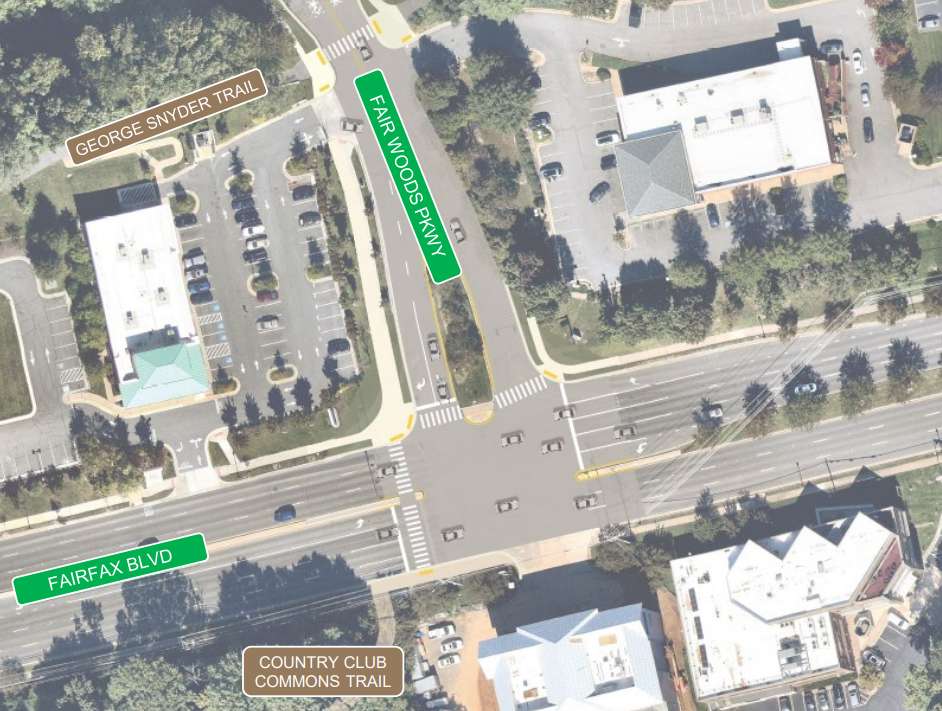
The Fairfax City Council recently approved several bicycle network enhancements along Fair Woods Parkway, its first project since adopting a bicycle master plan in 2021.
The unanimous adoption of the resolution gave city staff the go-ahead to engage engineering consultants to design the bike routes.
The final concept adds curb extensions at four intersections, including Cardinal Road, Cavalry, Scout and Blue Coat Drive, to help slow down cars and make it safer for people to walk. Improvements initially planned for Continental Lane were removed from the project after nearby residents raised concerns.
Staff are also considering adding crosswalks throughout the corridor and a shared-use path for biking and walking on one side of Fair Woods Parkway between Fairfax Blvd and the George Snyder Trail.
The city initiated its project to turn Fair Woods Parkway into a “neighborway” almost two years ago. The process included several rounds of community feedback through various surveys and public meetings.
Previously known as Plantation Parkway, Fair Woods Parkway was chosen for the first neighborway — a low-volume street designed to serve as a safe bicycle route — because of the area’s access to various local destinations and bike paths, Fairfax City Multimodal Transportation Planner Chloe Ritter told the city council during its March 26 meeting.
She noted it also addresses resident requests for improved traffic conditions and better bicycle infrastructure.
“We feel that this proposal provides a number of benefits, including shortening pedestrian crossing distances,” Ritter said. “It improves the visibility for drivers…removes uncontrolled pedestrian crossings and the requirement for vehicles to stop when the signal is green.”
The city’s bicycle master plan designates approximately 20 miles of neighborhood streets as “neighborways.”

While city staff are designing the neighborway, the public will have an opportunity to give their input about halfway through the design phase, per Ritter.
The project’s funding comes from a U.S. Department of Transportation grant via the Regional Surface Transportation Program. This program allocates funds to states and local governments for various public transportation projects, including pedestrian and bicycle infrastructure.
Almost all council members fully endorsed the project — with a few words of caution.
Councilmember Thomas Ross called it a significant move towards “humanizing the transportation network.” However, he also urged staff to evaluate the project’s effectiveness upon completion.
“I would also encourage perhaps a focus group or a discussion group with the community and in a year and a half, two years, whenever it seems appropriate to say, ‘What’s your reaction to this? Is it working? Is it making it safer for people to walk and get around? Is it safer to get in and out of the neighborhood?'” Ross said.
Councilmember Jon Stehle suggested that staff consult with the local police department about incorporating safety-promoting technologies, such as blue light stations, into the design.
“We talked previously about ‘fix-a-flat’ opportunities at certain locations in different areas along bike trails, etcetera,” he said. “There has to be some technology out there that’s up and coming or someone who’s looked at this in a different way that we should at least have the conversation about.”
The city’s webpage for the project says engineering and construction work could tentatively start later this year.
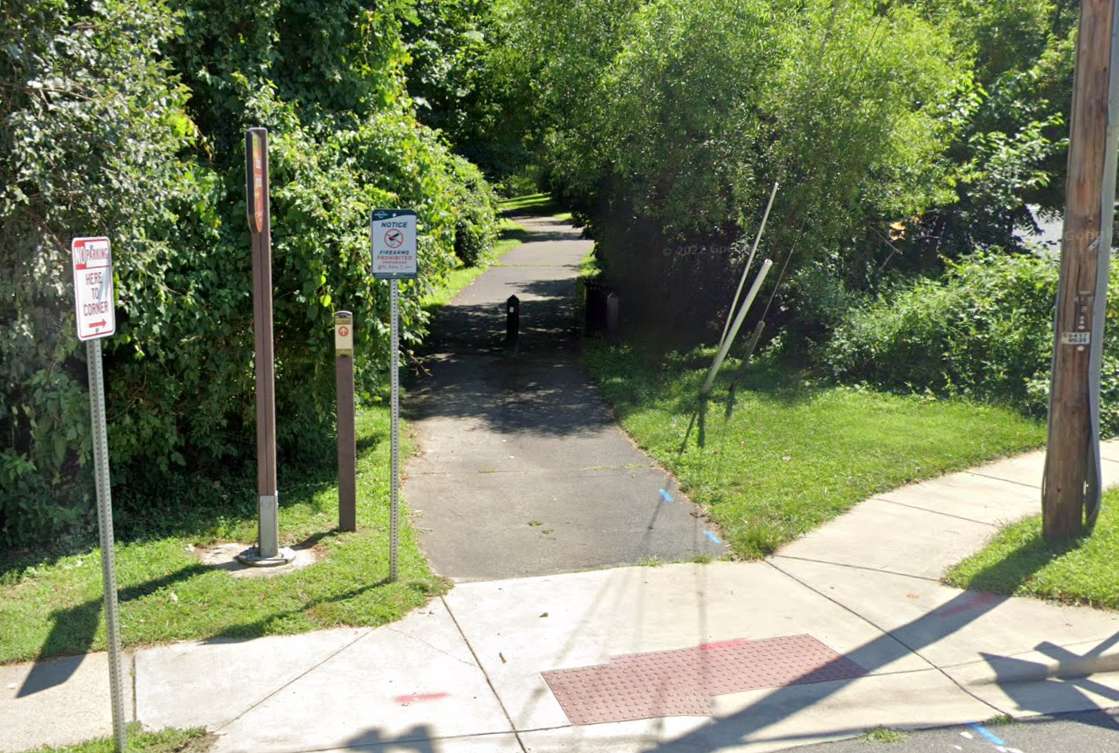
Fairfax City will complete the George Snyder Trail as planned after all.
In response to some community concerns, the Fairfax City Council discussed changing the pedestrian and bicycle project’s scope or even canceling it altogether during its meeting on Tuesday (Jan. 23). But council members failed to agree on any of the proposed alternatives, allowing the city to stay the course by default.
“None of the resolutions received enough support to change the current trail alignment,” City of Fairfax spokesperson Matthew Kaiser confirmed to FFXnow. “Staff will continue to acquire the needed land and come back to council in six months or so for [a construction] bid approval.”
The city has acquired rights-of-way for two of five needed parcels, Fairfax City Transportation Director Wendy Sanford told the council.
Over a decade in the making, the planned trail will run along the south side of Accotink Creek for about 1.8 miles from Chain Bridge Road (Route 123) to Fairfax Blvd (Route 50), connecting the existing George Snyder Trail to the I-66 shared-use path that’s slated to finish this spring.
However, some residents and environmental groups, including the Audubon Society of Northern Virginia, have objected to the proposed route for the 10-foot-wide trail, which will wind through a wooded area and require removing 553 trees. A segment in Shiloh Street Park that would’ve eliminated another 11 trees has been dropped from the plan, according to a city staff report.
The city has said 858 trees and 815 shrubs, all native species, will be planted to offset the lost trees.
Though the design is complete, Sanford said the council could cancel the project, realign the trail east of Fair Woods Parkway to use existing roads more, or construct only the segment west of Fair Woods Parkway.
Staff recommended either sticking with the existing plan or building only the western segment. If it cancels the project, the city would have to repay at least $395,000 in federal funding out of the $3 million it has spent so far, potentially putting it at a disadvantage for receiving future awards, Sanford said.
Most of the project’s $17.6 million budget comes from a concession fee that the I-66 Outside the Beltway toll lanes operator agreed to provide for transportation improvements in the corridor. Sanford said it’s unclear if any of that will need to be returned.
Revising the trail’s eastern segments would require restarting the design and engineering process, according to Sanford.
“This would delay the project, cause additional costs in engineering and potentially higher construction costs due to inflation when we do get to construction,” she told the council. “There’s also no assurance of feasibility for the new alignment or public support for any of the alternatives.”
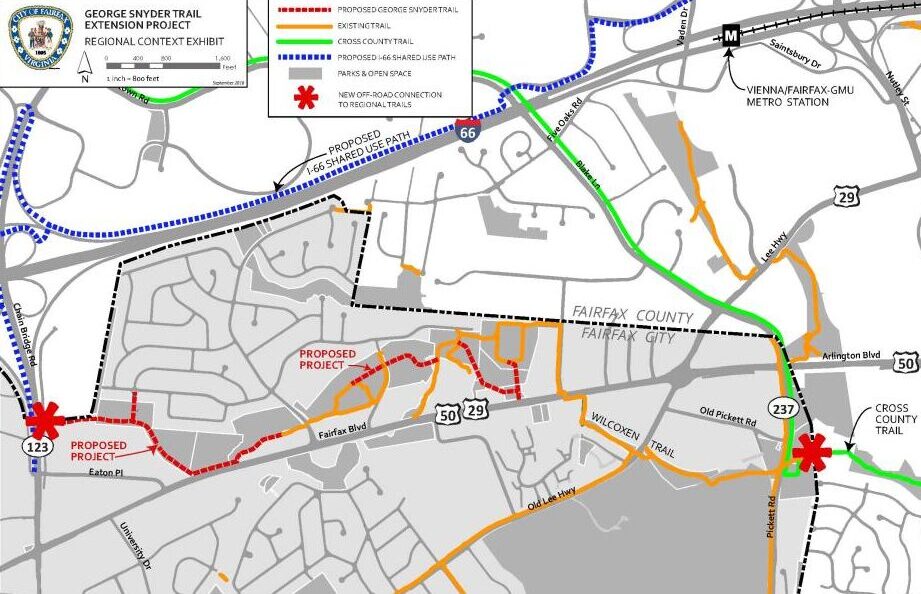
Councilmember Jeffrey Greenfield proposed building the western portion with two tweaks: merging it with the sidewalk on Route 50 where they run parallel and possibly rerouting it through WillowWood Plaza, an office complex on Eaton Place under review for redevelopment as housing. Read More
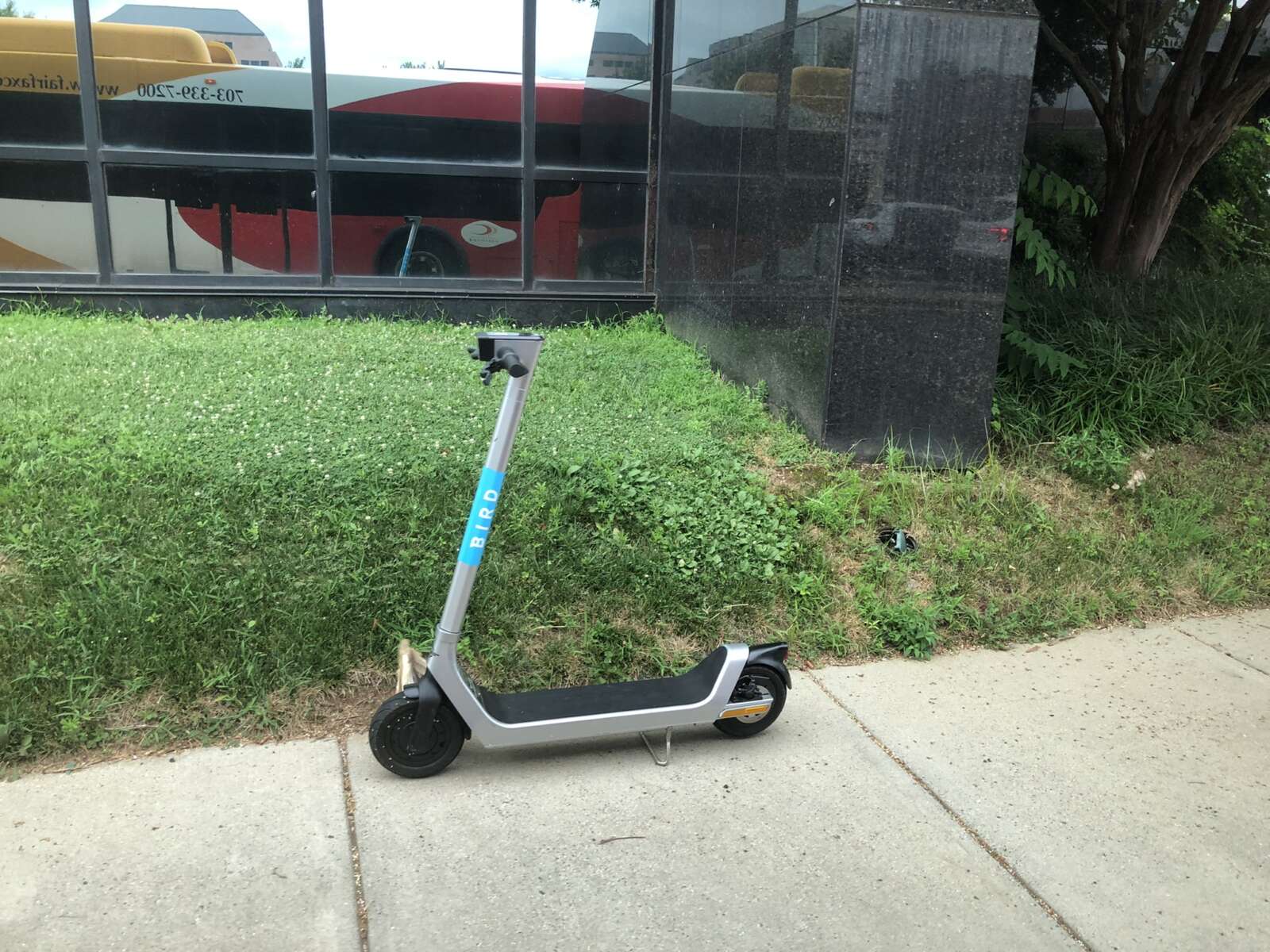
Fairfax County’s only electric scooter provider will continue operating even after filing for bankruptcy last month.
The company, Bird, will also maintain its scooters in Fairfax City, where it’s one of two companies in a pilot program.
“We expect to continue operations in Fairfax and Fairfax County as normal and we look forward to working with the city and county administration as a partner into the future,” a Bird representative wrote in an email to FFXnow.
The county and city have both been told by the company that service will go on. Bird has permission to operate 300 devices in Fairfax County, while the City of Fairfax generally permits up to 250 devices per company.
Bird and Superpedestrian’s LINK got permission to bring their products to Fairfax County in July 2021 following a November 2019 county board ordinance regulated shared mobility devices. Superpedestrian recently stopped all U.S. operations, though it had already been dropped from the county’s operator list after failing to renew its permit in January 2022.
The county doesn’t appear to have any new partners in the offing at the moment.
“Anyone may submit a Shared Mobility Device Operator Permit Application for review,” wrote Rebecca Makely, director of the county’s department of cable and consumer services, in an email to FFXnow.
Bird’s shared mobility devices saw nearly 20,000 rides between July and December 2023, according to data provided by the county, with an average ride distance of just over a mile during that period.
FairfaxCity authorized a shared mobility pilot program of its own in May 2019, but has yet to establish a permanent program. Bird and San Francisco-based Lime are currently authorized under the pilot, which the city council unanimously voted to extend through June 30, 2024 at a Jan. 9 meeting.
City staff expects to develop a proposal for a more permanent program by the time this extension ends.
“There was a lot of bumpiness during Covid, but a lot of the operations and usage have stabilized, and we feel like we can now begin to transition to a more permanent, long-term program,” Chloe Ritter, the city’s multimodal transportation planner, said at the meeting.
While the city doesn’t expect Bird’s bankruptcy filing to have immediate effects, it could inform program planning.
“We can’t predict what’s going to happen in six months or two years, but I think it’s a good reminder for us to keep our program flexible to respond to those kinds of things,” Ritter said.
In neighboring Arlington County, scooter and e-bike provider Veo recently declined to renew its permit, citing market conditions. Superpedestrian is also exiting Arlington as it shutters its U.S. business.
Bird and Bird-owned Spin still operate in Arlington, as does Lime, which announced near the end of 2023 that it had logged 500 million total rides on its devices.
A proposed express car wash at Fairfax Blvd and Lion Run in Fairfax City faces an uphill battle after council members expressed concerns about its potential traffic impact.
“I’m not sure that this is the right location for this kind of business — whether it’s yours or someone else’s — given that the location is the primary access and exit for the public school system and for people south of that area,” Fairfax City Councilmember Thomas Ross said during a work session last Tuesday, Jan. 9.
Under consideration is a special-use permit that would allow the national franchise, Tommy’s Express Car Wash, to redevelop 1.15 acres at 9917 Fairfax Blvd, which has been home to the Italian restaurant The Esposito’s Fairfax since 1982.
Maria Esposito, the owner of the restaurant, told FFXnow that the restaurant currently has no intention of closing.
“We have no information yet,” she said.
The lot also has a second retail building that was built in 1978 and is currently vacant.
The applicant, D.C.-based private equity firm Olympus Pines, initially submitted a pre-application for the project in November 2021, and the Board of Architectural Review conducted a work session last month.
Designed to process up to 200 vehicles per hour, the proposed 4,553-square-foot car wash anticipates serving a “peak volume” of 50-75 cars per hour with a maximum staff of four to five, according to the city council staff report.
The site currently has a one-way entrance and one-way exit along Fairfax Blvd. The applicant has also proposed incorporating three “stacking lanes to avoid backup.”
While several council members, including Mayor Catherine Read, agreed the site should be redeveloped, there was some debate about whether the volume of vehicles served might lead to traffic issues along the route.
“Fairfax Blvd is so heavy with traffic already…There may not be a queue to get the car washed, but there may be a queue getting out of there,” Councilmember So Lim said during the work session.
Councilmember Kate Doyle Feingold pointed to other examples of businesses along Fairfax Blvd, such as Chick-fil-A, which has stacking lanes to mitigate the queuing issue.
“So, if there was an analysis where people can say, ‘Oh, I see how this could function differently,’ that might help alleviate some of those concerns,” she said.
Olympus Pines co-founder Trevor Sperry emphasized that the car wash is engineered for quick service, with vehicles in and out within minutes. He noted that other locations have washed thousands of cars daily without causing traffic disruptions.
“If people are backing up on our site, people are going to stop coming,” Sperry said during the work session.
“So, I think the main concern is, will we cause a backup on Fairfax Blvd?” he continued. “We’ve never had that happen in all of our locations, and we will provide camera data in which we served 3000 vehicles in a day without backing up the road.”
The proposal remains under review. A public hearing, which will be held before any voting takes place, has not yet been scheduled.
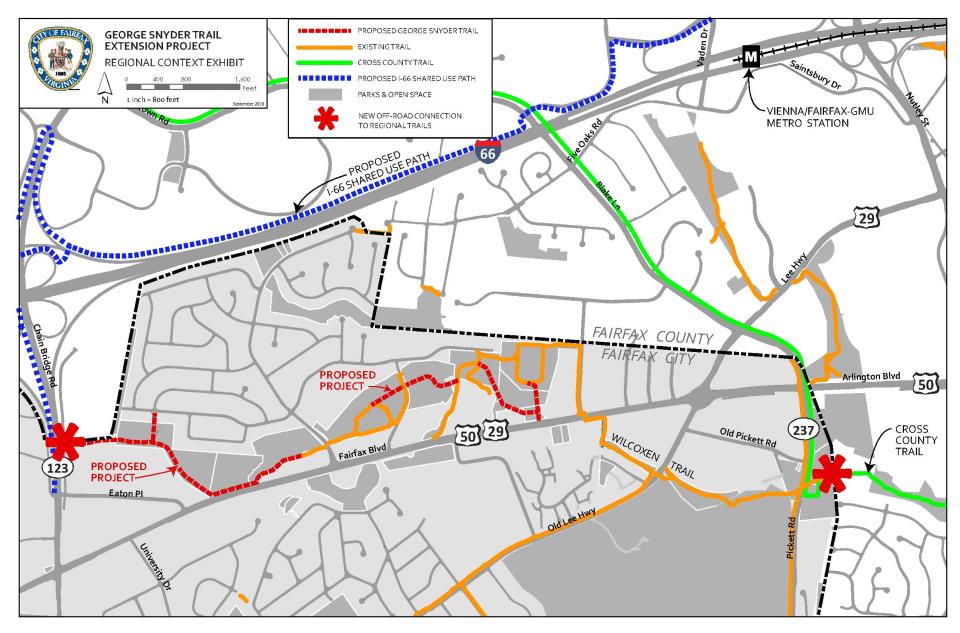
The Fairfax City Council will vote on the future of a much-debated trail planned in the heart of the city later this month.
During a meeting on Tuesday (Jan. 9), the city’s transportation director, Wendy Sanford, presented the council with options for proceeding with the George Snyder Trail project, which will complete a 2-mile trail along the southern side of Accotink Creek between Chain Bridge Road (Route 123) and Fairfax Blvd (Route 50).
Plans for the Snyder trail have been underway for more than a decade, but the project has drawn some criticism from environmentalists who say it will eliminate hundreds of trees, negatively impacting the area’s woodlands.
A group of city residents sent an email to the city council and staff on Jan. 2 urging them to consider alternatives that would add a trail or bicycle lanes on existing streets, such as Fairfax Blvd, Cardinal Road or Eaton Place.
The planned route has gotten support from bicycling advocates, who say it’ll fill a missing link in the region’s bicycle network, particularly in the I-66 corridor.
In a presentation, staff recommended the council either continue with the proposed changes or modify it by only constructing the western portion from Chain Bridge Road to Fair Woods Parkway.
“To continue with the project as proposed, that would mean putting the project out to bid,” Sanford explained. “We have the 100% [design] plans to continue with the right-of-way acquisition.”
If the city cancels the project, Sanford said it would be required to repay some or all of the $3 million it has already spent, potentially affecting the city’s ability to be awarded funds for future projects.
Sanford noted that the suggested modification would reduce the overall cost, while still delivering some of the trail. However, Councilmember So Lim pushed for a cancellation, saying she thinks “it’s all or nothing.”
Councilmember D. Thomas Ross disagreed and said cancelling the project could have a negative impact on taxpayers.
“We’ve heard consistently the concerns about cost of operation and development and maintenance of the trail if it’s completed as proposed,” he said. “It’s going to be nothing compared to what we hear when we start talking about paying up to $3 million.”
Mayor Catherine Reed was also against canceling the project, but said she won’t participate in the scheduled vote on Jan. 23 unless there’s a tie.
“What what we understand about environmental impact is significant. No one is saying here that there’s no impact in building this trail, but we have heard it described as destroying a forest,” Reed said.
Anna Safford, the city’s urban forester, acknowledged the environmental concerns surrounding the trail, but said recreation helps to protect land.
“If you don’t use land, you lose land, but at the same time, recreation isn’t conservation,” Safford said. “And there is a very big difference in the land types along this corridor.” Read More
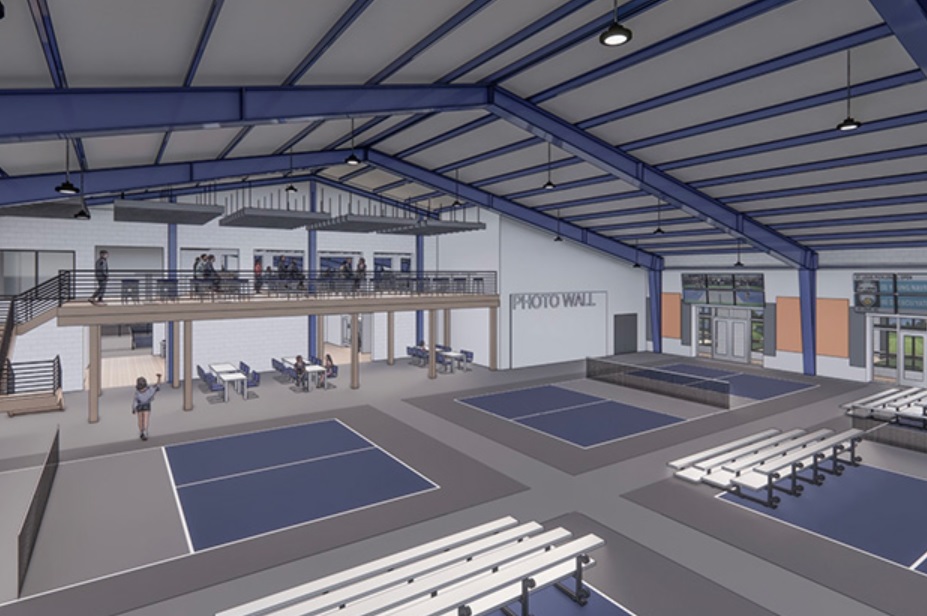
(Updated at 11:45 a.m.) Pickleball devotees will soon have new places to play in the Fairfax area.
The Fairfax City Council voted last night (Tuesday) to grant a special use permit to Down the Line Sports Center, which will build an indoor pickleball facility to replace the vacated CVS in Courthouse Plaza (10390 Willard Way).
The 10,000-square-foot former pharmacy will be transformed into a dedicated pickleball facility with three full-sized courts and two half-sized courts, according to the application submitted by Down the Line owner Jenni Bae.
Though an opening date hasn’t been set yet, Down the Line is already preparing to extend its reach with a second, larger facility in Annandale that’s also anticipated to launch next year.
“This is an exciting new chapter for Down the Line Sports Center, and we are thrilled to bring our first location to the heart of Old Town,” Bae said. “Our vision is to create a space where patrons of all ages can come together, play, and connect. We’re grateful for the support of the City Council, Fairfax City Economic Development, and the Façade and Interior Improvement Grant program for making this dream a reality.”
Provided by Fairfax City Economic Development (FCED), the grant program reimburses 50% or up to $20,000 of the costs for businesses to get established or expand in the city.
A tennis player who got into pickleball during the COVID-19 pandemic, Bae told FFXnow that the original plan was to open an indoor pickleball facility in Annandale. But then, she connected with the FCED and saw an opportunity to open a smaller center more quickly.
“We recognized it as basically a beneficial opportunity for both Fairfax City and our business,” she said.
Because the Fairfax City facility will be relatively small, Down the Line hopes to offer social events to the community in lieu of pickleball tournaments and leagues, which require at least six courts, according to the application.
The company said it’s open to partnering with the Old Town Fairfax Business Association and the Central Fairfax Chamber of Commerce on future events, while also participating in festivals and other outdoor city events.
In a press release, the FCED lauded the facility as “a significant leap towards invigorating Old Town Fairfax and fostering a sense of community.” Fairfax City has six pickleball courts at Green Acres Center (4401 Sideburn Road), including one that’s indoors, and four at Van Dyck Park (3720 Blenheim Blvd), but this is the city’s first dedicated, indoor pickleball complex.
Fairfax City Mayor Catherine Read credited local pickleball players at Green Acres Center and former city council member Janice Miller with advocating for more playing options in the city to support the growing — and sometimes polarizing — sport.
“We have delivered a solution that works no matter the weather,” Read said. “That value is made greater by the fact many residents can walk there or take the free CUE bus.”
According to Bae, Down the Line hopes to open the Fairfax facility this winter, followed in the second half of 2024 by the Annandale facility.
Located at 4311 Ravensworth Road, the 50,000-square-foot Annandale center will feature 18 permanent indoor courts, seven golf simulators and a sports bar. The company envisions it as a future destination for both amateur and professional players in the D.C. region and beyond.
“Our goal is to bring in huge events that we’ve never been able to have in this area before because no one has ever been able to provide the indoor space that we can provide,” Bae said. “…We will become a destination center where people will fly in from other states to play in our tournaments…They’re going to bring more business to the restaurants, to the hotels and to everything in the Annandale area because of our center.”
Rendering via Down the Line Sports Center
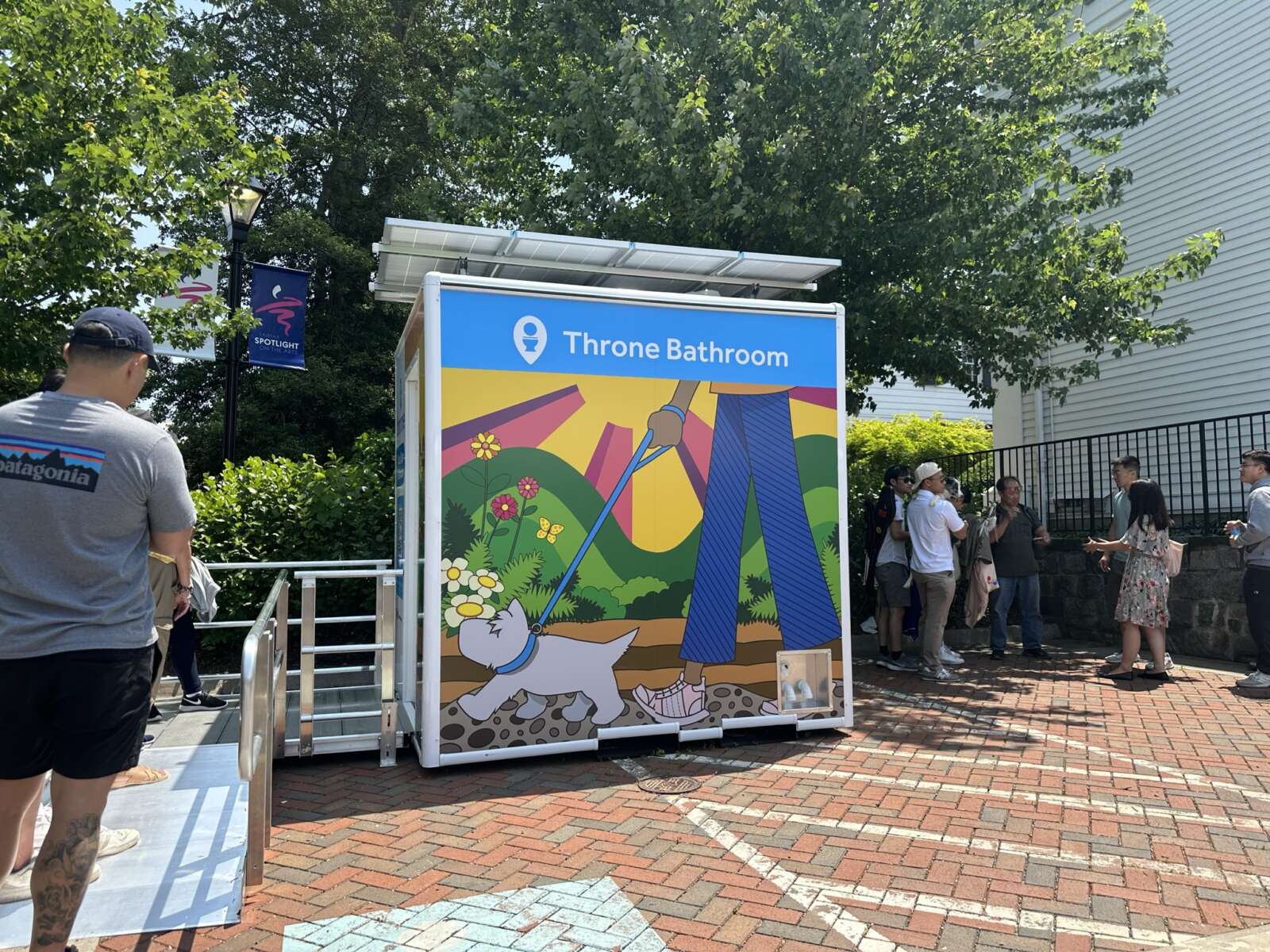
Fairfax City’s experiment with “elevated” port-a-potties may be coming at too high a cost to consider continuing it long-term.
During a meeting on Tuesday (Nov. 14), the Fairfax City Parks and Recreation Department provided the Fairfax City Council with a progress report on the high-tech, portable Throne restrooms that have been available around the city for the past seven months.
The department initiated the pilot this spring in response to calls for increased access to restrooms in the Fairfax Circle area, Old Town Square, and Van Dyck Park.
Parks and Recreation Director Stacey Sommerfield said they were looking for a vendor to provide a secure, accessible, clean facility that didn’t require any additional staff hours. The department chose local startup Throne Labs, which launched in 2020 and provides “an elevated experience” with solar-powered, touchless outdoor bathrooms.
“They feature running water, flushing toilets, climate control, they were ADA-accessible, provided changing stations, have secure access, and were cleaned every 50 uses,” Sommerfield said.
In May, one unit was placed in Old Town Square and in Van Dyck Park. Another unit was placed on Fairfax Blvd in the area of the former Hy-Way Motel (9640 Fairfax Blvd) in June. From their launch to Nov. 1, the Thrones have been used 11,356 times overall, according to Sommerfield.
“The Van Dyck unit is our highest-use unit, which is not surprising to us because Van Dyck Park is very well-used,” she said.
Usage of the Old Town Square unit fluctuated based on events and weather. The Fairfax Blvd location has been the slowest to catch on, Sommerfield said, adding that it may be moved in the future to garner more attention.
“Right now the only location that we have access to is the Hy-Way Motel, but we think we might be able to reposition the unit on the site in order to make it more attractive,” she told the city council. “Right now, it is very close to the road.”
In August, the department launched a voluntary survey requesting feedback through QR codes posted outside the units. The survey garnered 67 responses, which Sommerfield described as positive.
“We do have a 38% return rate for users of the Thrones, so we have a lot of people that return and use them again,” she added.
The units are priced according to a three-tiered system based on the average number of uses per day. The more they are used, the more they cost. Additionally, the artwork that wraps around the Thrones costs $5,500 each.
“As of November 1, 2023, $74,392 has been spent on wrapping and monthly fees. $175,608 remains for the continuation of the program through the remainder of the fiscal year,” City Manager Robert Stalzer wrote in a summary for the council.
Looking forward to 2024, Sommerfield said there will be a $50 increase to the monthly fee for units that are used less than 50 times per day — the low to mid tier.
“So, the status of the pilot program is that the parks department really views this as an interim option until we can build brick-and-mortar bathrooms,” Sommerfield said.
Concerned about the cost, Counilmember Jeffrey Greenfield suggested the parks department explore buying bathrooms.
“The cost continues to concern me, especially when Thrones is doing deals with other jurisdictions, doing pilots at no cost, and we’re paying a lot,” he said.
Greenfield acknowledged that some areas in the city will struggle to get infrastructure in place for permanent bathrooms, but said the option of purchasing bathrooms should be considered before deciding to continue with Throne.
The city council approved $250,000 for the pilot in April. That funding will cover the three restroom units through July 2024.

